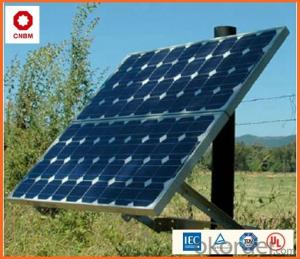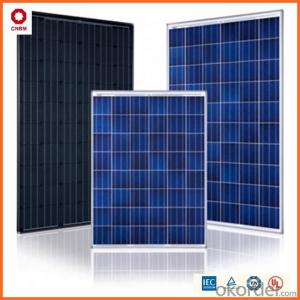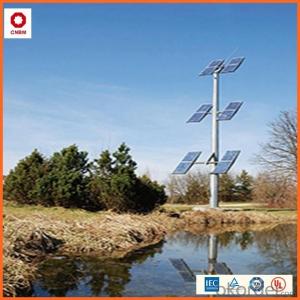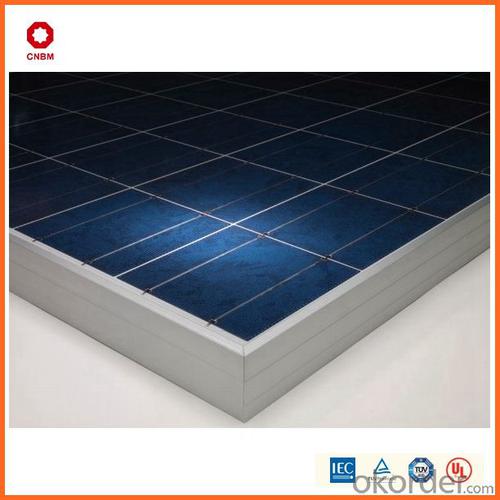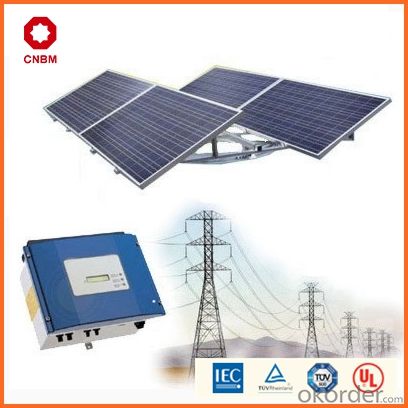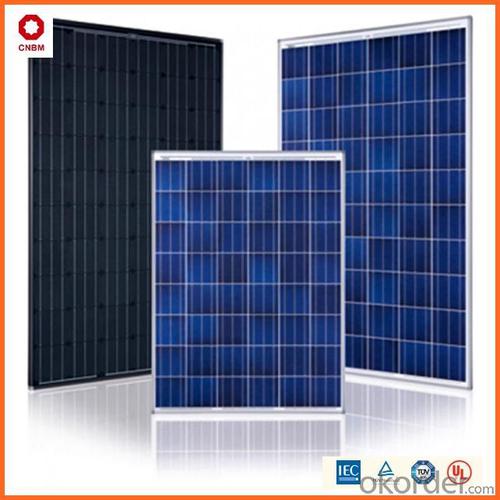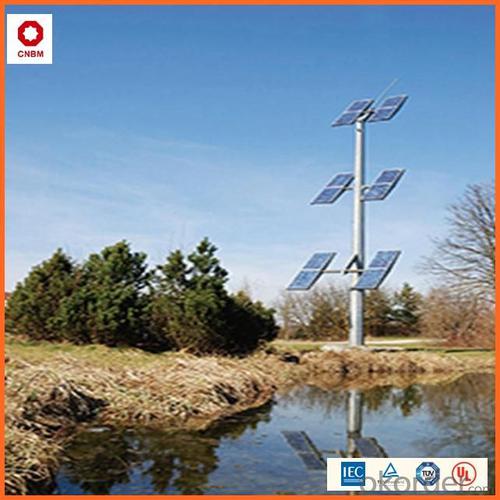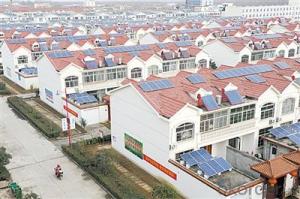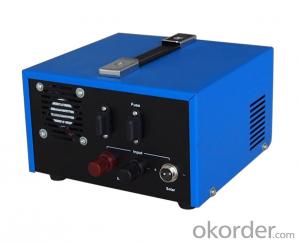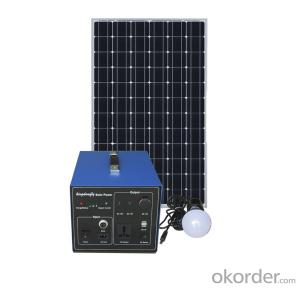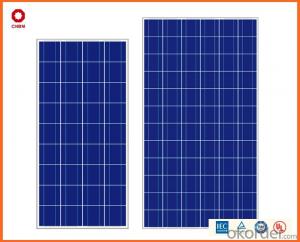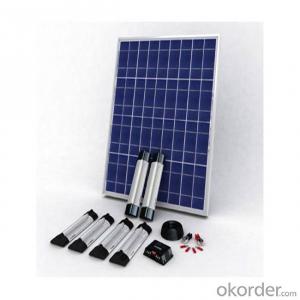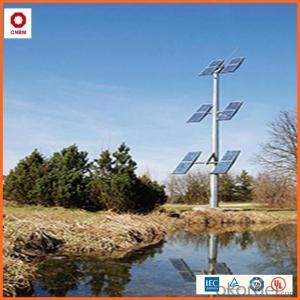Solar Energy Systems Company 65w Poly Small Solar Panels On Stock With Good Quality
- Loading Port:
- China main port
- Payment Terms:
- TT OR LC
- Min Order Qty:
- 1 watt
- Supply Capability:
- 10000000 watt/month
OKorder Service Pledge
OKorder Financial Service
You Might Also Like
Specification
Hot Sale !!! Quality and Safety of Small Poly Solar Panel 25~85w
1. Rigorous quality control meets the highest international standards.
2. High-transmissivity low-iron tempered glass, strong aluminium frame.
3. Using UV-resistant silicon.
4. IS09001/14001/CE/TUV/UL
Warranties of Small Poly Solar Panel 25~85w
1. 10 years limited product warranty
2. 15 years at 90% of the minimal rated power output
3. 25 years at 80% of the minimal rated power output
Specification
Characteristics of Poly solar panels CNBM (25-85W) | |||||
Max Power Voltage Vmp(V) | 30.3 | 30.8 | 31.1 | 31.4 | 31.85 |
Max Power Current Imp(A) | 7.60 | 7.64 | 7.73 | 7.81 | 7.85 |
Open Circuit Voltage Voc(V) | 36.1 | 36.6 | 37 | 37.3 | 37.68 |
Short Circuit Current Isc(A) | 8.50 | 8.55 | 8.65 | 8.75 | 8.85 |
Max Power Pm(W) | 230W | 235W | 240W | 245W | 250W |
Temperature Coefficient of Cells Poly solar panels CNBM (25-85W) | |
NOCT | 45± 2 |
Temperature Coeffucients of Isc | 0.0492 |
Temperature Coeffucients of Voc | -0.3374 |
Temperature Coeffucients of Voc | -0.4677 |
Mechanical Data of Poly solar panels CNBM (25-85W) | |
Dimension | 1638 × 982 × 40 mm |
Weight | 19.5 kg |
No. of Cells and Connections | 60 (6 ×10) |
Tolerance | 0 ~ + 5 W |
Cell | Monocrystalline Cell 156 × 156 mm |
Packing | 624 Pcs/40ft(H) Container |
Limits of Poly solar panels CNBM (25-85W) | |
Operating Temperature | -40 to +85 |
Storage Temperature | -40 to +85 |
Max System Voltage | 1000VDC(IEC) / 600VDC(UL) |
Features of our products:
• High conversion efficiency mono/poly-crystalline amorphous silicon solar cells
• Modules incorporate high performance bypass diodes to minimize the power drop caused by shading
• High transmittance, low-iron tempered glass
• High performance EVA encapsulant to prevent destroying and water.
• AI frame: without screw, corner connection. 8 holes on the frame can be installed easily
• Good performance of preventing from atrocious weather such as wind and hails
• Certifications: CE IEC TUV VDE UL, Class I
• 10 years 90% power output warranty

Shipping of Small Poly Solar Panel 25~85w
By Sea | Delivery from Shanghai or Ningbo seaport |
By Air | Departure from Shanghai Pudong Airport |
By Express | Post by DHL, EMS, UPS, TNT. |
- Q: Can solar energy systems be used in areas with high levels of air pollution from wildfires?
- Despite high levels of air pollution from wildfires, solar energy systems can still be utilized. Though the efficiency of solar panels may be diminished due to reduced sunlight and energy generation, they are not rendered completely useless. Even in partially shaded conditions, solar panels are capable of producing electricity, albeit with a lower output. Moreover, advancements in solar panel technology have enhanced their resilience to various environmental factors such as smoke and dust particles. Furthermore, solar energy systems can serve as a valuable source of electricity during and after wildfires when power outages are prevalent. Therefore, despite the impact of air pollution from wildfires on their performance, solar energy systems can still be effectively employed in these areas.
- Q: What is the role of maximum power point tracking (MPPT) in solar energy systems?
- The role of maximum power point tracking (MPPT) in solar energy systems is to maximize the efficiency and output of the solar panels. MPPT algorithms continuously monitor and adjust the operating point of the solar panels to ensure that they are always operating at their maximum power point, where the panel's output is optimized. This helps to extract the maximum amount of energy from the solar panels, increasing the overall efficiency of the system and maximizing the power generation potential of the solar energy system.
- Q: What happens to a solar energy system during a power outage?
- If a solar energy system is connected to the grid, it will typically cease generating electricity during a power outage. This is because grid-tied solar systems are designed to automatically shut down when the grid goes down in order to ensure the safety of workers repairing the power lines. Consequently, even if the sun is shining and the panels are capable of generating electricity, the system will not operate until grid power is restored. However, there are certain types of solar energy systems, such as off-grid or hybrid systems, that can continue generating electricity even during a power outage. Off-grid systems are designed to store excess solar energy in batteries, which can then be used to power the home or facility during periods of no sunlight or power outages. These systems are not connected to the grid and operate independently, offering a reliable power source even when the grid is down. On the other hand, hybrid systems are connected to the grid but also have the ability to store energy in batteries. In the event of a power outage, these systems can switch to battery power, allowing them to continue generating electricity and provide backup power to essential loads in the building. This provides a level of energy independence and resilience during emergencies or extended power outages. It is important to understand that the ability of a solar energy system to function during a power outage depends on the specific type of system installed and its configuration. Seeking guidance from a professional solar installer or system provider can help determine the most suitable system for individual needs and requirements.
- Q: What is the role of voltage regulators in a solar energy system?
- The role of voltage regulators in a solar energy system is to ensure that the voltage output of the solar panels is regulated and maintained within a specific range. Solar panels generate direct current (DC) electricity, which needs to be converted to alternating current (AC) for use in homes and businesses. However, the voltage output of solar panels can fluctuate based on factors such as the amount of sunlight, temperature, and system load. Voltage regulators, also known as charge controllers, are responsible for stabilizing the voltage output from the solar panels. They monitor the voltage level and adjust it as needed to prevent overcharging or undercharging of the batteries or the electrical loads connected to the system. By maintaining a consistent voltage, voltage regulators protect the batteries from damage caused by overcharging, which can reduce their lifespan. They also prevent undercharging, ensuring that the batteries are charged to their optimal level, maximizing their efficiency and performance. Additionally, voltage regulators play a crucial role in protecting electrical devices connected to the solar energy system. They prevent voltage spikes or surges that could potentially damage sensitive equipment, such as inverters or appliances. In summary, voltage regulators are essential components in a solar energy system as they regulate and stabilize the voltage output from the solar panels, protecting batteries and electrical devices from potential damage.
- Q: Can solar energy systems be used in all regions?
- No, solar energy systems can be used in all regions, but their efficiency and effectiveness may vary depending on factors such as sunlight availability, weather conditions, and geographical location.
- Q: Can solar energy systems be leased or rented?
- Yes, solar energy systems can be leased or rented. Leasing or renting solar panels allows individuals or businesses to access the benefits of solar energy without the upfront costs of purchasing the system. This option is especially popular for those who may not have the financial resources to buy a solar energy system outright.
- Q: Can solar panels be installed on vertical surfaces?
- Indeed, it is possible to install solar panels on vertical surfaces. While the most commonly used and efficient method involves mounting solar panels on rooftops or tilted surfaces that face the sun, there are also specialized solar panels specifically designed for vertical installations. These solar panels, known as vertical or facade solar panels, are typically lightweight and frameless in design, making them easy to mount on vertical surfaces such as walls or building facades. Vertical solar panels are an excellent solution for buildings with limited roof space or for those who wish to maximize energy production on all available surfaces. However, it is important to note that vertical installations may not be as efficient as traditional rooftop installations due to the reduced exposure to sunlight. The performance of vertical solar panels can also be affected by the angle and orientation of the surface, as well as potential shading from nearby structures or trees. Nonetheless, advancements in solar technology and design have made vertical installations more practical and efficient than ever before. By carefully considering factors such as surface tilt, orientation, and shading, solar panels can be successfully installed on vertical surfaces, thus harnessing clean and renewable energy.
- Q: What are the advantages of solar energy systems?
- There are several advantages of solar energy systems. Firstly, solar energy is a renewable source of energy, meaning it will never run out as long as the sun continues to shine. This is in stark contrast to fossil fuels, which are finite resources and are being depleted at an alarming rate. Secondly, solar energy is environmentally friendly. Unlike fossil fuels, solar energy systems do not emit harmful greenhouse gases or pollutants that contribute to climate change and air pollution. This makes solar energy a clean and sustainable alternative that helps in reducing our carbon footprint and mitigating the negative effects of global warming. Additionally, solar energy systems can significantly reduce electricity bills. Once the initial investment in installing solar panels is made, the cost of harnessing solar energy is relatively low. Solar energy is free, and the only cost incurred is the maintenance and occasional repair of the equipment. This can lead to substantial long-term savings on energy bills, especially as the cost of traditional electricity continues to rise. Moreover, solar energy systems can provide energy independence. By generating your own electricity, you are less reliant on utility companies and the fluctuating prices of fossil fuels. This independence also provides a level of energy security, as solar energy systems are not vulnerable to supply disruptions or price fluctuations caused by geopolitical tensions or natural disasters. Lastly, the installation of solar energy systems stimulates local economies and job creation. The solar industry has experienced significant growth in recent years, leading to the creation of numerous jobs in manufacturing, installation, and maintenance. This not only boosts the economy but also provides employment opportunities in a rapidly expanding sector. In conclusion, the advantages of solar energy systems are numerous. From being a renewable and environmentally friendly source of energy to reducing electricity bills, providing energy independence, and creating jobs, solar energy is a viable and sustainable solution for our energy needs.
- Q: Can solar energy systems be used in areas with high levels of dust or dirt?
- Yes, solar energy systems can be used in areas with high levels of dust or dirt. However, excessive accumulation of dust or dirt on solar panels can reduce their efficiency. Regular cleaning and maintenance of solar panels are essential to ensure optimal performance in such areas.
- Q: What is the impact of tree shading on solar energy system performance?
- Tree shading can have a significant impact on the performance of solar energy systems. When trees cast shadows on solar panels, it reduces the amount of sunlight reaching the panels, resulting in decreased energy production. This shading can lead to reduced efficiency, lower energy output, and potentially affect the overall performance and financial viability of the solar energy system. It is crucial to consider the positioning of trees when installing solar panels to maximize their exposure to sunlight.
Send your message to us
Solar Energy Systems Company 65w Poly Small Solar Panels On Stock With Good Quality
- Loading Port:
- China main port
- Payment Terms:
- TT OR LC
- Min Order Qty:
- 1 watt
- Supply Capability:
- 10000000 watt/month
OKorder Service Pledge
OKorder Financial Service
Similar products
Hot products
Hot Searches
Related keywords

